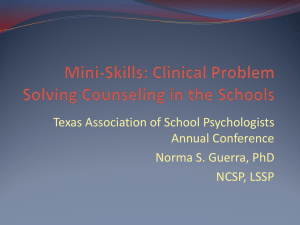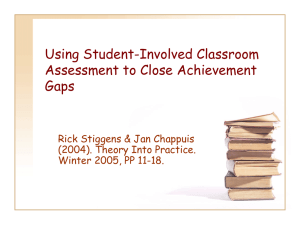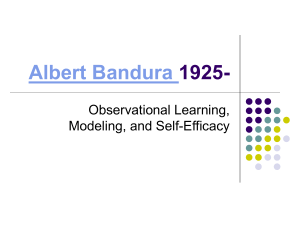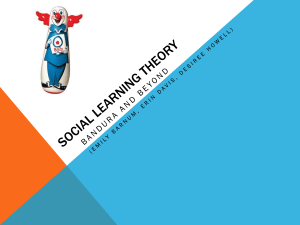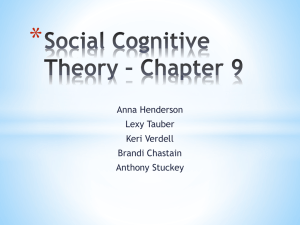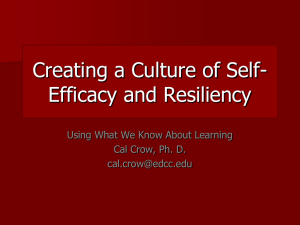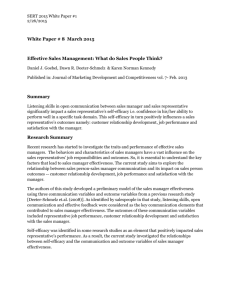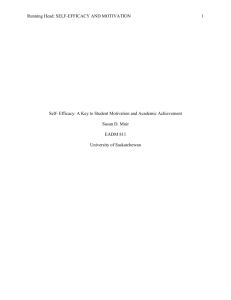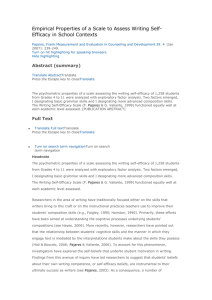Self-efficacy in Language Learning and Teaching
advertisement
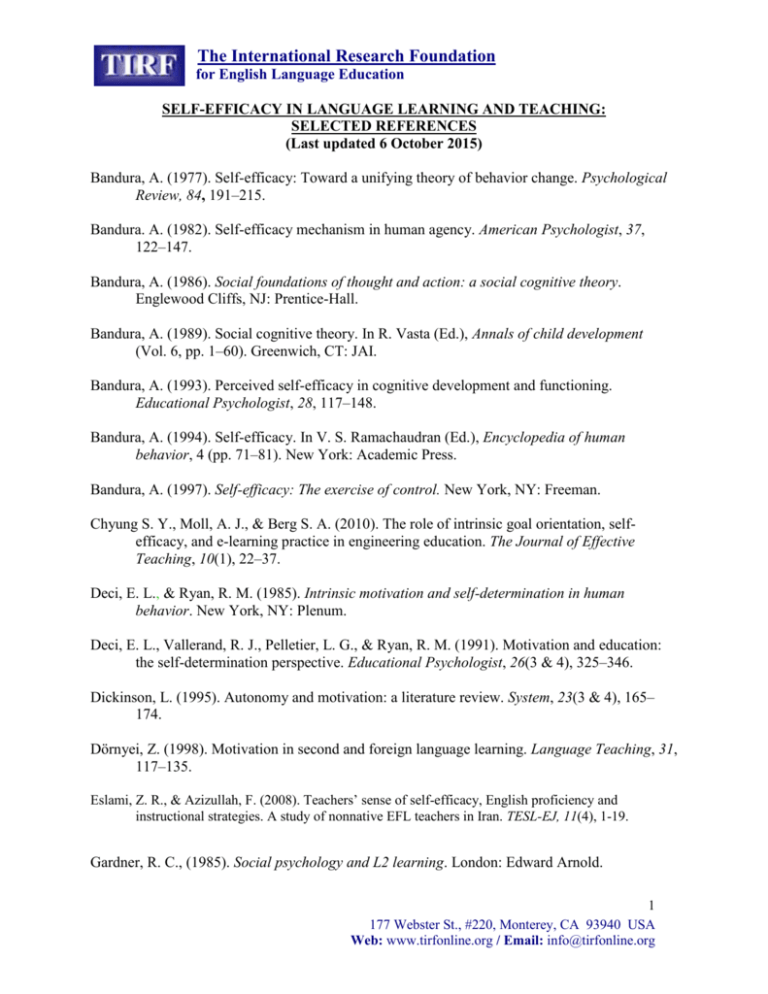
The International Research Foundation for English Language Education SELF-EFFICACY IN LANGUAGE LEARNING AND TEACHING: SELECTED REFERENCES (Last updated 6 October 2015) Bandura, A. (1977). Self-efficacy: Toward a unifying theory of behavior change. Psychological Review, 84, 191–215. Bandura. A. (1982). Self-efficacy mechanism in human agency. American Psychologist, 37, 122–147. Bandura, A. (1986). Social foundations of thought and action: a social cognitive theory. Englewood Cliffs, NJ: Prentice-Hall. Bandura, A. (1989). Social cognitive theory. In R. Vasta (Ed.), Annals of child development (Vol. 6, pp. 1–60). Greenwich, CT: JAI. Bandura, A. (1993). Perceived self-efficacy in cognitive development and functioning. Educational Psychologist, 28, 117–148. Bandura, A. (1994). Self-efficacy. In V. S. Ramachaudran (Ed.), Encyclopedia of human behavior, 4 (pp. 71–81). New York: Academic Press. Bandura, A. (1997). Self-efficacy: The exercise of control. New York, NY: Freeman. Chyung S. Y., Moll, A. J., & Berg S. A. (2010). The role of intrinsic goal orientation, selfefficacy, and e-learning practice in engineering education. The Journal of Effective Teaching, 10(1), 22–37. Deci, E. L., & Ryan, R. M. (1985). Intrinsic motivation and self-determination in human behavior. New York, NY: Plenum. Deci, E. L., Vallerand, R. J., Pelletier, L. G., & Ryan, R. M. (1991). Motivation and education: the self-determination perspective. Educational Psychologist, 26(3 & 4), 325–346. Dickinson, L. (1995). Autonomy and motivation: a literature review. System, 23(3 & 4), 165– 174. Dörnyei, Z. (1998). Motivation in second and foreign language learning. Language Teaching, 31, 117–135. Eslami, Z. R., & Azizullah, F. (2008). Teachers’ sense of self-efficacy, English proficiency and instructional strategies. A study of nonnative EFL teachers in Iran. TESL-EJ, 11(4), 1-19. Gardner, R. C., (1985). Social psychology and L2 learning. London: Edward Arnold. 1 177 Webster St., #220, Monterey, CA 93940 USA Web: www.tirfonline.org / Email: info@tirfonline.org The International Research Foundation for English Language Education Goker, S. D. (2006). Impact of peer coaching on self-efficacy and instructional skills in TEFL teacher education. System, 34, 239-254. Hsieh, P., & Kang, H. (2010). Attribution and self-efficacy and their interrelationship in the Korean EFL context. Language Learning, 60, 606–627. Kline, P. (2000). The handbook of psychological testing (2nd ed.). London, UK: Routledge. Linnenbrink, E. A., & Pintrich, P. R. (2003). The role of self-efficacy beliefs in student engagement and learning in the classroom. Reading and Writing Quarterly, 19, 119-137. Malpass, J. R., O'Neil, H. F., & Hocevar Jr, D. (1999). Self‐regulation, goal orientation, self‐efficacy, worry, and high‐stakes math achievement for mathematically gifted high school students 1, 2. Roeper Review, 21(4), 281-288. Matthews, P. H. (2010). Factors influencing self-efficacy judgments of university students in foreign language tutoring. The Modern Language Journal, 94(4), 618–635. Mills, N. (2014). Self-efficacy in second language acquisition. In S. Mercer & M. Williams (Eds.), Multiple perspectives on the self in SLA (pp. 6–22). Bristol, UK: Multilingual Matters. Nunn, M. (2013). Cultural factors in high school student motivation to study less commonly taught languages. Journal of the National Council of Less Commonly Taught Languages, 14, 27–50. Pintrich, P. R., Smith, D. A. F., Garcia, T., & McKeachie, W. J. (1991). A manual for the use of the Motivated Strategies for Learning Questionnaire (MSLQ). Ann Arbor: University of Michigan, National Center for Research to Improve Postsecondary Teaching and Learning. Samimy, K. & Tabuse, M. (1992). Affective variables and a less commonly taught language: A study in beginning Japanese classes. Language Learning, 42, 377–398. Schmidt, R., Boraie, D., & Kassabgy, O. (1996). Foreign language motivation: Internal structure and external connections. In R. Oxford (Ed.), Language learningmotivation: Pathways to the new century (pp. 9-56). Manoa: University of Hawai’i Press. Schunk, D. H. (1985). Participation in goal setting: Effects on self-efficacy and skills of learning disabled children. Journal of Special Education, 19, 307–317. Schunk, D. H. (1989). Self-modeling and children’s cognitive skill learning. Journal of Educational Psychology, 81, 155–163. Schunk, D. H. (1991).Self-efficacy and academic motivation. Educational Psychologist, 26, 207–231. 2 177 Webster St., #220, Monterey, CA 93940 USA Web: www.tirfonline.org / Email: info@tirfonline.org The International Research Foundation for English Language Education Schunk, D. H., & Miller, S. D. (2002). Self-efficacy and adolescents’ motivation. In F. Pajares & T. C. Urdan (Eds.), Academic motivation of adolescents (pp. 29-52). Charlotte, NC: IAP. Schunk, D. H., & Pajares, F. (2002). The development of academic self-efficacy. In A. Wigfield & J. S. Eccles (Eds.), Development of achievement motivation (pp. 15-31). San Diego, CA: Academic Press. Strong, R., Silver, H. F., & Robinson, A. (1995). Strengthening student engagement: What do students want. Educational Leadership, 53(1). 8–12. Tschannen-Moran, M., Woolfolk Hoy, A., & Hoy, W. K. L. (2007). Teacher efficacy: Its meaning and measure. Review of Educational Research, 68, 202-248. Ushioda, E. (2003). Motivation as a socially mediated process. In D. Little, J. Ridley, & E. Ushioda (Eds.), Learner autonomy in the foreign language classroom: Teacher, learner, curriculum and assessment (pp. 90-102). Dublin: Authentik. Ushioda, E. (2009). A person-in-context relational view of emergent motivation, self and identity. In Z. Dörnyei & E. Ushioda (Eds.), Motivation, language identity and the L2 self (pp. 215-228). Bristol, UK: Multilingual Matters. Woodrow, L. (2011). College English writing affect: Self-efficacy and anxiety. System, 39, 510– 522. Zimmerman, B. J. (2000). Self-efficacy: An essential motive to learn. Contemporary Educational Psychology, 25, 82–91. 3 177 Webster St., #220, Monterey, CA 93940 USA Web: www.tirfonline.org / Email: info@tirfonline.org
